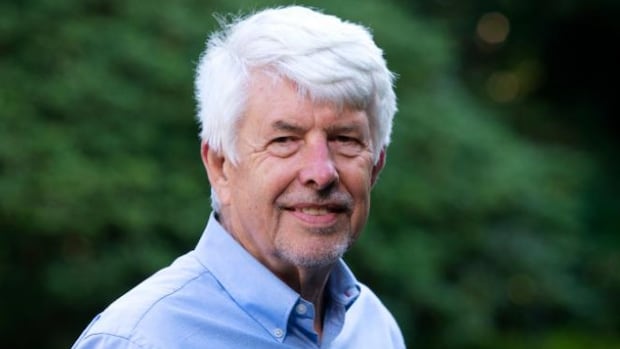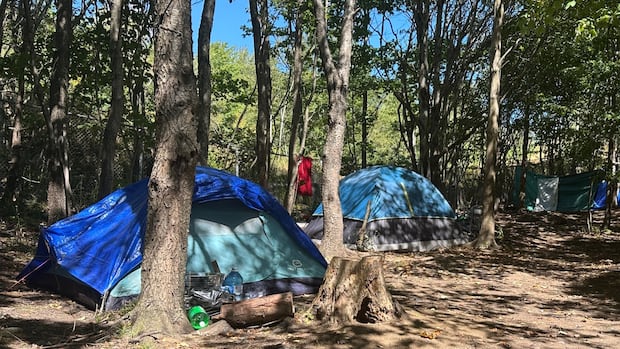As wildfires burn out of control near their communities, hundreds of Manitoba First Nations residents have been put up in hotels in Niagara Falls, Ont. — for some around 1,800 kilometres away from their homes.
For Pimicikamak Cree Nation resident Stevie Muskego, who “never really left the reserve” before, travelling so far away has been “kind of strange” and “very stressful.”
Speaking in Niagara Falls Monday, Muskego told Radio-Canada he’s unsure how long he’ll have to stay in Ontario and is taking things day by day.
“What can you do?” he said, adding he’s grateful for the support he’s received thus far.
“I’m very scared for my community,” Muskego said, also mentioning the three dogs and two cats he had to leave behind.
But staying home wasn’t safe. He arrived in Niagara on Sunday, a journey that involved several days of travelling to a few communities along the way.
More than 17,000 people are being forced from their homes in parts of Manitoba due to the fires, with mandatory evacuations in place for communities including Flin Flon, Cranberry Portage and Pukatawagan. The Manitoba government declared a provincial state of emergency last week.
Kurtis Ferland, an evacuee from Pukatawagan, told CBC News he could only bring one bag of his belongings as he left home with thick smoke in the air.
“Everything else can be replaced,” he said. “Just lives. That’s the only thing. Family can’t be replaced. So hopefully everyone gets out of there. There’s still lots of people out there.”
Sheena Garrick, a volunteer supporting Pimicikamak evacuees, told Radio-Canada that due to the number of people displaced, there’s no more room in Manitoba, hence the need to go to Ontario for shelter.
Garrick is from Pimicikamak herself. She said many evacuees were skeptical about coming to Niagara Falls because things were chaotic in Winnipeg, but she thinks they’ll be better served in Ontario.
About 90 people from Pimicikamak, also called Cross Lake, travelled to Niagara Falls Sunday, Garrick said.
Overall 250 evacuees were set to be settled in the Niagara Falls area Sunday, with several hundred more expected to have flown in Monday, Manitoba Keewatinowi Okimakanak (MKO) — which represents northern Manitoba First Nations — said on its Facebook page Sunday.

Niagara Falls, which has a population of about 94,000 per the 2021 census, is a popular tourist destination. Its tourism website says the city has 12,000 guest rooms.
In recent years its hotels were home to another group of displaced people. In 2023, Immigration, Refugees and Citizenship Canada housed thousands of asylum seekers in Niagara Falls, using 1,500 to 2,000 rooms in March 2023 out of over 3,500 across Canada.
On Monday, Niagara Falls Mayor Jim Diodati told CBC News helping evacuees is “the Canadian thing to do.”
“Because of our big inventory of hotel rooms, you know, we’re happy that we can do our part and play Team Canada,” he said, adding the city is preparing to possibly house thousands of people.
Diodati said the evacuation is federally funded but the municipality will do its best to make evacuees feel welcome. “We’ll do our part making sure they’ve got some great attractions, passes and access to whatever amenities that they need.”
In a statement, MKO Grand Chief Garrison Settee praised evacuation efforts in Ontario, saying “this is the level of coordination we strive for in Manitoba,” and “the level of respect our members deserve while they are dealing with a very traumatic experience.”
First Nations and provincial governments working with risk management company
Indigenous leaders in Manitoba have accused the federal and provincial governments of poor communication and slow responses to resource requests.
MKO is partnering with risk management company Xpera, which specializes in evacuations. Xpera vice-president Robert Garland told CBC News his company has contracts with Ontario and Manitoba.
He said they came to Niagara because it has the capacity to handle an influx of people, and “a strong history of Indigenous support.”
Evacuee Danner Francois told Radio-Canada having to evacuate quickly was scary and he worries about his house burning down. But now that he’s in Niagara Falls, he said he feels better. “It’s peaceful now. I feel a lot safer — no fire, no smoke.”
Manitoba Premier Wab Kinew says the province has received ‘amazing’ assistance in its fight against wildfires, adding Canada will have to contend with future fire seasons being more like this, ‘which means scaling up our firefighting capability.’
Speaking to reporters Monday, Manitoba Premier Wab Kinew said about 1,000 hotel rooms will open in Winnipeg to house evacuees.
The province had 25 active wildfires as of Sunday, including eight considered out of control.
Kinew said fighting multiple wildfires in the western provinces is a strain on shared resources, so Canada will need to “contend with future fire seasons being more and more like this, which means scaling up our firefighting capability.”
“We could use every water bomber we can get our hands on,” he said, noting Manitoba ordered some, but will have to wait five years to get them.







